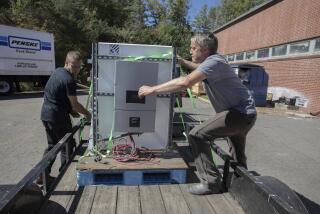Don’t Let Blackouts Unplug Your Business
The massive power outage in San Francisco on Tuesday reminds us how dependent businesses are on electricity. For many companies, being without power means being out of business, not to mention the risk of data loss and equipment damage.
There isn’t anything you can do to prevent a power outage, but you can try to protect your equipment, your data and your ability to operate if you experience an outage.
First, your business--like your home--should have an adequate supply of battery-powered flashlights as well as a transistor radio so you can see and keep up to date in the event of a power failure.
Second, a lot of businesses have digital phone systems that depend on electricity. You should also have at least one regular phone line that doesn’t require electricity. If you have a cellular phone, keep it charged and with you at work just in case the power or phone lines are down.
If you have a notebook PC, keep the battery charged and make sure it has the software and data you need to keep your business running. I back up my desktop machine to my notebook PC daily and, if the power goes out, I can use the notebook PC for two or three hours until the battery dies. If I need more time, I can move it to a place where there is electricity. I also keep a power adapter in my car, which allows me to plug my notebook PC or other low-wattage devices into my car’s cigarette lighter.
It’s important to have a surge protector for your computers, fax machines and other electronic equipment; make sure it’s adequate to protect your equipment.
Most manufacturers rate their surge protectors in joules, a measurement of how much energy the device is capable of absorbing. Look for at least 200 joules. Kensington (https://www.kensington.com) has a SmartSockets power strip with a built-in 1,500-joules surge protector. One model protects phones as well as electrical systems. The suggested retail price is $40, but you can get surge protectors rated at 520 joules for less than $20.
Joe Loberti, a general manager at American Power Conversion (https://www.apcc.com), a manufacturer of power protection equipment, says consumers should primarily look for the “let through” voltage rating, which measures how much surge is let through to the device you’re protecting. APC’s least expensive surge protectors are rated at 400 volts, but Loberti recommends that PCs be protected with devices that let through fewer than 300 volts.
Regardless of whether you have a surge protector, if you experience a power failure, unplug your electronic equipment before the power comes back on. That’s when you’re most likely to experience a surge. If the equipment doesn’t work, and if it’s plugged into a surge protector or power strip, plug it directly into the wall before you assume it’s broken. The surge may have destroyed the surge protector or power strip and not the equipment.
While a surge protector may protect your equipment, it won’t protect any data that you hadn’t saved to the hard drive when the power went down. Power failures are one of several reasons that a computer might crash without notice, so it’s important to save your data every few minutes or whenever you make a change to a file.
To give you some additional time to save your file, you can equip one or more of your PCs with an uninterruptable power supply (UPS). This device has a built-in backup battery that is kept charged at all times. In the event the power goes off, the UPS keeps your machine running for a period of time. How long depends on the type of UPS you buy, but most inexpensive units run for about 15 minutes--more than enough time to save your work and shut down your machine. Most UPS systems also provide surge protection. APC offers a range of UPS systems starting at $99. The least expensive will run a single PC for about 10 minutes. The $299 Back-UPS PRO 500 will run a single PC for about 20 minutes, or up to four machines for a shorter period of time.
If you operate your own Web server, consider physically moving your server to an Internet service provider that has a power backup system. Pasadena-based Earthlink, like most major ISPs, has diesel generators that supply power to their servers in the event of a power failure, according to spokeswoman Kirsten Kappos. Most ISPs also offer a “co-location” service, as Earthlink does. Businesses that own their own Internet servers can keep their server at Earthlink to take advantage not only of the ISP’s high-speed connection to the Internet but its power backup systems, raised floors (to protect against floods) and protection services.
*
Lawrence J. Magid can be reached via e-mail at larry.magid@latimes.com, or visit his Web site at https://www.larrysworld.com. On AOL, use keyword “LarryMagid.”
More to Read
Sign up for Essential California
The most important California stories and recommendations in your inbox every morning.
You may occasionally receive promotional content from the Los Angeles Times.










